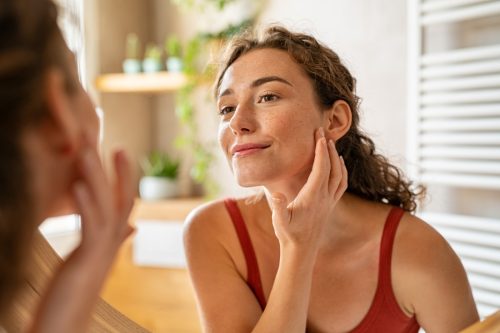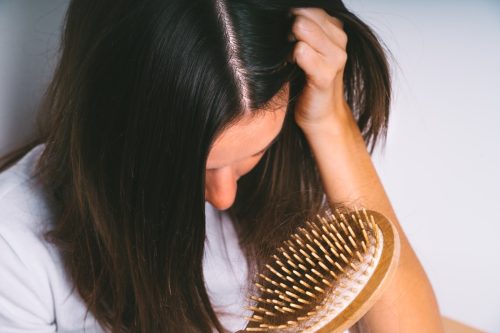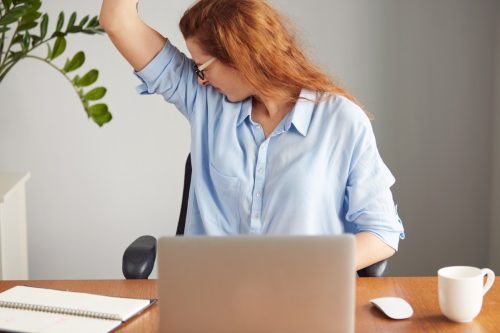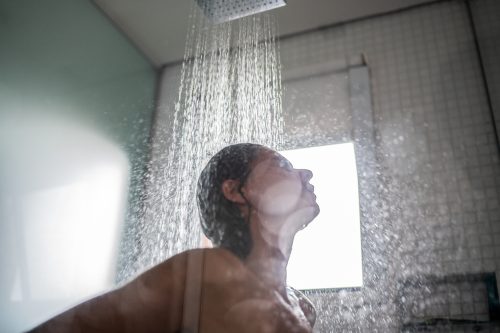What Happens If You Don’t Shower for a Month, According to Doctors

For many of us, taking a shower is a daily habit—or at least, a daily goal. (Who hasn’t been too lazy to take a shower on occasion?) But whether you prefer to lather up first thing in the morning or at bedtime, the idea of skipping your shower for an extended amount of time doesn’t appeal to many (or maybe any) people.
Well, there is at least one person. James Hamblin, MD, is a doctor who has literally gone years without taking a shower—and he thinks others should too. He told NPR that daily bathing isn’t “necessary for basic hygiene” and that showering less is better for your body’s microbiome (and could ease things like acne, eczema, and psoriasis), your wallet, and the environment.
If you feel inspired to take a page from Hamblin’s playbook and try not showering for, say, one month, we decided to investigate what you might expect—besides being a little stinky. Read on to find out what other doctors say before deciding whether you want to try this experiment for yourself.
READ THIS NEXT: Doctor Who Hasn’t Showered in Years Thinks Others Should Join Him.
It could cause a buildup of bacteria on your skin.

First and foremost, not showering could cause a buildup of bacteria on your skin, board-certified dermatologist Dustin Portela, DO, tells Best Life. However, he’s quick to point out that an increase in bacteria isn’t always harmful—and may even be good for us.
“Our skin has a rich complement of bacteria, fungi, and viruses that live on the surface, and the things you do to your skin impact this microbiome daily,” he explains. “Without showering, you would likely experience a significant change in that microbiome, which is not necessarily a bad thing. It may give an opportunity for increased growth of good bacteria that can be protective against skin disease.”
If you get hurt, however, it may be a different story. “Other bacteria could thrive that may contribute to body odor or superficial skin infections,” Portela notes. “It is possible that you could have increased risk of skin infections if you were to experience a cut or a scrape. It’s largely dependent upon the type of organisms that will flourish on your skin in the absence of regular showering or bathing.”
Your hair could pay the price.

Skincare expert Simran Sethi, MD, say that not showering (and therefore not washing your hair) could take a toll on your scalp, and even make your hair fall out.
“On the scalp, we have our greatest hair growth, which brings with it more sebaceous gland activity,” she explains. “Oil, dirt, and debris are the perfect environment for fungal growth. Washing too infrequently will increase fungal infections on the scalp—and fungal scalp infections will eventually cause hair loss.”
And your scalp isn’t the only area of concern, she points out: “In areas of the body where the skin rubs against itself, like the underarms, sweat and bacteria can lead to fungal infections that will then start spreading to adjacent skin. While the skin on our arms and legs is less prone to infections, it’s important to remember that if that skin tissue has a high bacterial burden, it can be prone to strawberry skin (ingrown hair),” she explains. “Not showering will leave excess oil and dead skin debris on the skin, which will easily clog follicles and promote ingrown hair.”
For more health news sent directly to your inbox, sign up for our daily newsletter.
Your body order could neutralize.

“A skipped shower here or there probably won’t trigger body odor, especially if you haven’t been exercising,” the experts at Healthline write. But after a month, they note, you’d get a little—or maybe a lot—stinky. “Body odor is inevitable the longer you go without a shower, particularly in your armpits and groin,” they explain.
Hamblin was not immune: In an article he wrote for the Atlantic, he admitted he “was an oily, smelly beast.” But the thing is, his body odor was only terrible at first, it eventually stabilized. “But after a while… your ecosystem reaches a steady state, and you stop smelling bad,” he wrote. “I mean, you don’t smell like rosewater or Axe Body Spray, but you don’t smell like B.O., either. You just smell like a person.”
How long it takes to get to this state can vary for each person, and it won’t happen for everyone. Portela says your personal B.O. factor might not be the same as someone else’s, and “will depend upon the complement of bacteria that an individual tends to grow. Some people may experience odor for a few days to weeks before things normalize. However, it is possible that some individuals would experience persistent body odor that may not go away.”
You may become more attuned to your body.

Not showering for a month may not be all bad news. In his book, Clean: The New Science of Skin, Hamblin wrote that when he gave up showering, he “started to become aware of patterns,” such as an increase in body odor when he was stressed, sleep deprived, or “generally not thriving.”
“Essentially, I became more attuned to what my body was trying to tell me,” he wrote. “It seemed to be telling me not so much ‘wash me’ as ‘go outside, move around, be social, et cetera.'” So if you’re curious about your personal patterns, it might be worth trying this experiment.
You might rethink your hygiene habits in the long-term.

Stinky or not, going without a shower for a month might inspire you to reconsider your daily shower habit. “A shower every day could be bad for your skin,” Healthline reports. “Some dermatologists only recommend a shower every other day, or two to three times a week.”
And, as Hamblin pointed out in a piece for The Atlantic, you’ll save money on cosmetic products, as well as conserving water and time, if you cut down on your shower frequency. “Commercials tell us to remove the oil from our skin with soap, and then to moisturize with lotion,” he wrote. “Other commercials tell us to remove the oils from our hair, and then moisturize with conditioner. That’s four products—plus a lot of water and time—and few people question whether it’s anything short of necessary.”
Still, for many of us, a steamy shower is just too good to go without—Harvard Health reports that two-thirds of people in the U.S. shower daily. Luckily, Portela says there’s no need to give it up: “For most people, a daily shower is completely healthy,” he says. “If you have a tendency towards dry skin, I recommend only using your soap or body wash on areas of the skin, like the armpits, groin, and buttocks. This will help to keep down any body odor without using soap that can dry out the rest of your skin.”
Does all this shower talk have you ready to hop into one right now? While you’re in there, don’t forget to wash these body parts!